|
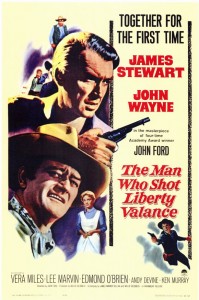
Synopsis:
A beloved politician (Jimmy Stewart) returns with his wife (Vera Miles) to the small Western town where he’s famous for having killed a bullying gunslinger named Liberty Valance (Lee Marvin); but as he begins to relate the story of his relationship with the recently deceased town drunk, Tom Doniphon (John Wayne), new details about the killing emerge.
|
|
Genres, Themes, Actors, and Directors:
- John Carradine Films
- John Ford Films
- John Qualen Films
- John Wayne Films
- Lee Marvin Films
- Lee Van Cleef Films
- Revenge
- Westerns
- Woody Strode Films
Response to Peary’s Review:
Peary argues that this “marvelous John Ford western” — about the transition from an untamed western frontier to an era of “law and order”, as well as our tendency to valorize legends at the expense of the grittier truth — “looks better with every viewing”, and “certainly… summarized themes that were vital to earlier Ford westerns”. He notes that “for Ford, the real heroes were men like Tom who tamed the wilderness and made it possible for civilization to take root”, and he points out that “it is a shame that such pioneers have no place in civilization”, given that “in a law-and-order world of lawyers and politicians, Tom is just as anachronistic as gunslingers like Liberty”. He writes that the “picture has interesting characters and their relationships with each other are complex”, and he argues that the “picture has strong emotional resonance”. As noted in TCM’s article, upon its release …Valance was apparently dismissed as a lesser entry in Ford’s lengthy oeuvre, with specific criticisms leveled at Ford’s choice to make the film in black-and-white and primarily on a sound-stage; but in later years, critics (like Peary and many others) began to recognize its thematic and aesthetic values.
While I appreciate much about how …Valance is constructed, I’ll admit it’s not a personal favorite. Ford’s characteristic inclusion of comedic supporting characters — most specifically Andy Devine’s cowardly sheriff, presumably meant to provide some levity to the proceedings — simply feels forced and out of place here; and Stewart’s idealistic, stubborn “young” lawyer comes across as merely another iteration of his earlier starring roles for Frank Capra. With that said, I admire the craftsmanship of the script (based on a story by Dorothy M. Johnson), which manages to evoke a surprising amount of tension despite the fact that we can guess the truth behind the title from the beginning; however, it starts to bog down a bit towards the end, when Stewart goes head-to-head with Marvin in a contrived, Capra-esque town hall scene, and Wayne (“Think back, pilgrim.”) conveniently saves the day. Speaking of Marvin, he deserved the notoriety he gained for his key role here as Liberty Valance; he represents everything corrupt and vile about a lawless west in which might overtakes right every time.
Redeeming Qualities and Moments:
- Lee Marvin as Liberty Valance
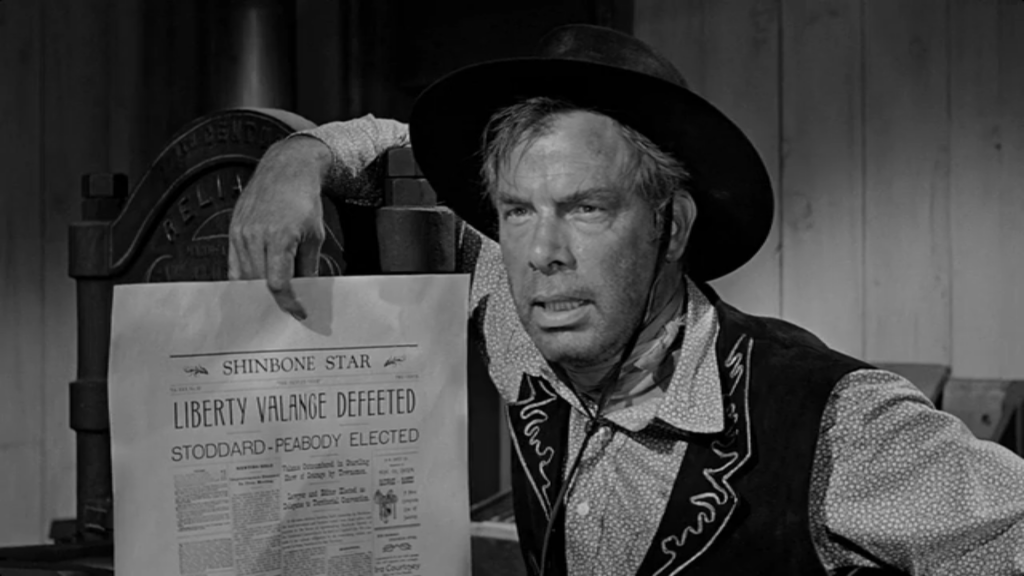
- William Clothier’s cinematography
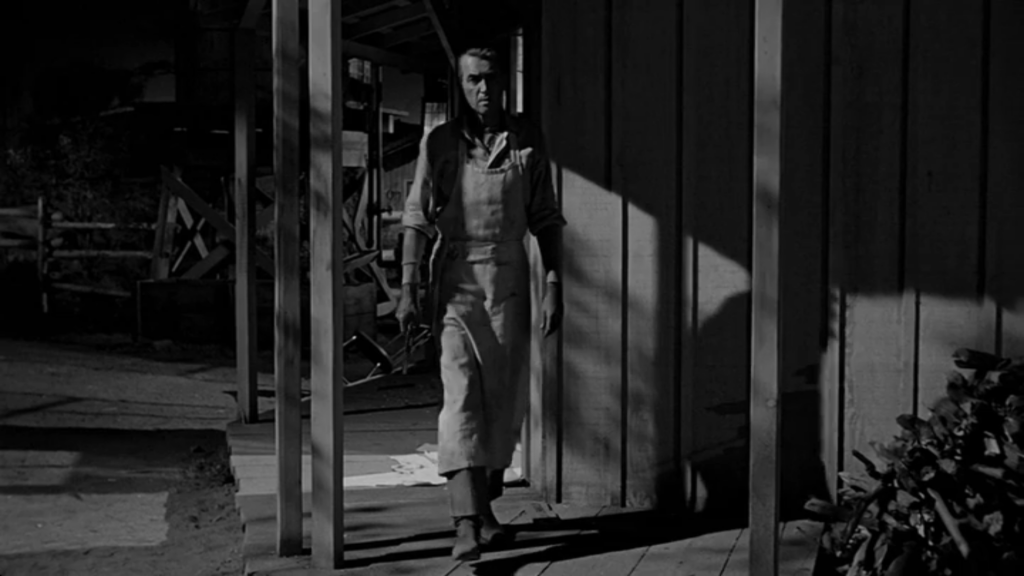
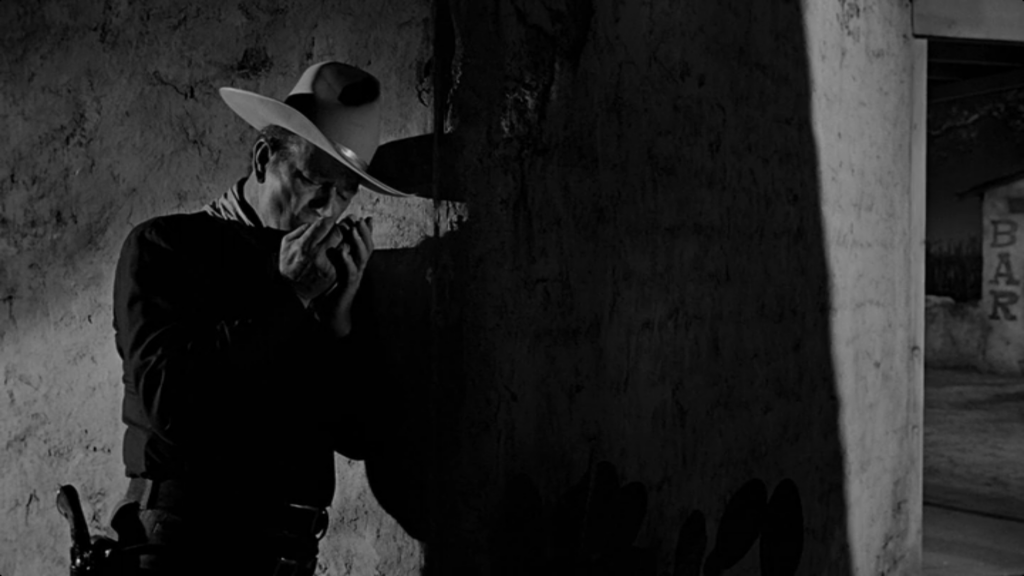
- The impressive final shoot-out
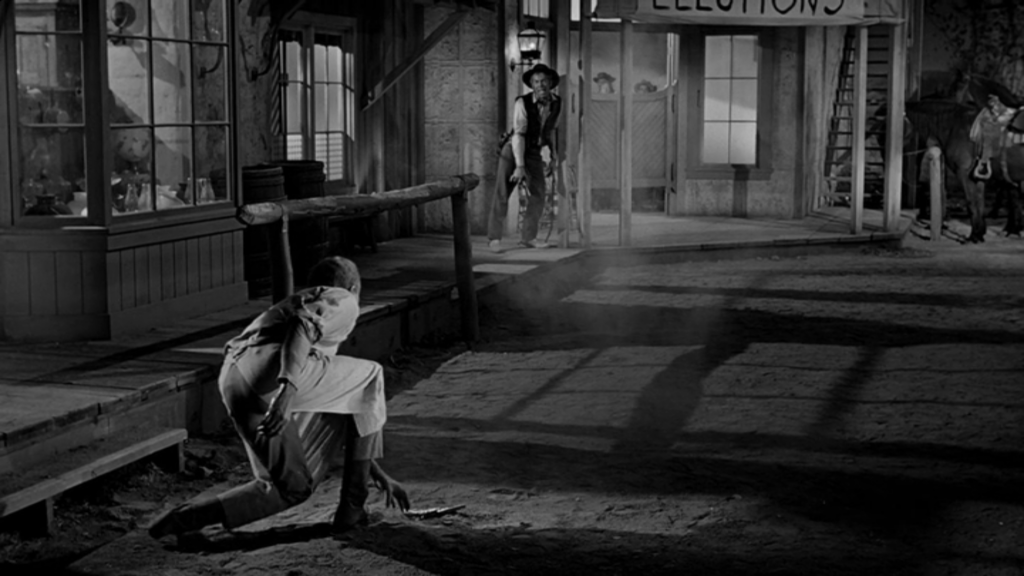
Must See?
Yes, as one of Ford’s acknowledged classics. Listed as one of the Best Films of the Year in Peary’s Alternate Oscars.
Categories
- Genuine Classic
- Important Director
(Listed in 1001 Movies You Must See Before You Die)
Links:
|





One thought on “Man Who Shot Liberty Valance, The (1962)”
Perhaps surprisingly, I don’t consider this must-see – although it’s not a bad film and certainly not a waste of time.
On thinking about it, I can’t off-hand say that I’ve ever seen a bad Ford film. Not really. Even while watching some of Ford’s ‘minor’ work, one can still sense that someone committed is at the helm. It seems rather clear that Ford never intends to give anything less than his best – unlike, for example, my favorite director…John Huston: you can sort of sense when Huston has become somewhat bored working on certain films.
Some of the problem with ‘Liberty Valance’, for me, stems from the fact that the budget for the film seems insufficient, and, though that’s not Ford’s fault, it hurts the film – especially in the first half, when the cast appears to be compensating for the fact that it looks like they’re in a kind of bargain-basement tv show. It’s jarring. It’s not the fact that the film is in black-and-white – just that it doesn’t seem to have enough money behind it. This is alleviated somewhat when lighting is used effectively – and some of the night scenes do help in creating a more realistic environment. But it remains an unfortunate blot on the picture.
As well – strangely – the cast overall seems to move in and out of over-acting. This is also not Ford’s fault, I don’t think. The script seems to fall in and out of an unnatural mode, which doesn’t help when subtext or subtlety are necessary – and the poor actors have no choice but to go with it. This is not Wayne at his controlled best and even Stewart seems to have some difficulty with tone at times. One scene in particular – with O’Brien, alone in his newspaper office, giving a kind of drunken monologue – makes the usually sturdy actor seem somewhat foolish. In the mass meeting sequence, when he bursts in menacingly with his cohorts, Marvin actually seems a little uncomfortable being as forceful as he is – when it would be more effective if he held back some, maybe. (And, for someone with only two guys at his side, he sure gets away with a lot of messy bravado – while about 100 men around him just let him do it. But that’s the thing with this film; for some reason, I start looking for little things to pick at. I wouldn’t be doing that if I were more caught up in the film.)
That said…it’s still an enjoyable film. It does have that great line in it: “When the legend becomes fact, print the legend.” ~which helps underscore the film’s worthy theme. Ford has made plenty of films that I do consider must-see. I just don’t feel it’s necessary to put most of Ford’s films in that category. This is a good film, even if it’s not among Ford’s best.